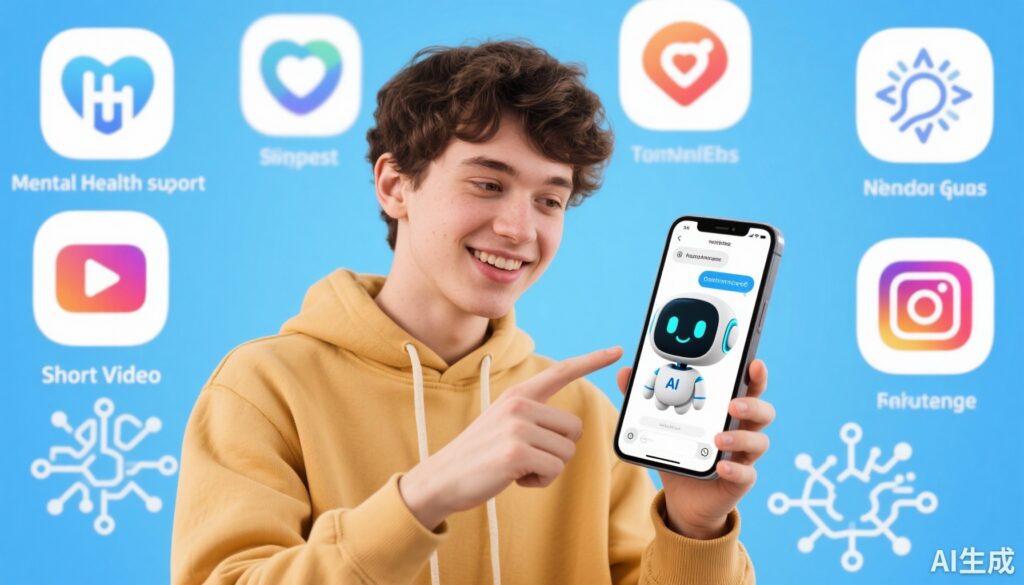Highlight
- A 28-day randomized controlled trial (RCT) evaluated an AI conversational agent trained on a large language model (LLM) for addressing mild depression and anxiety in young adults.
- Dialog interventions delivered via a short video app significantly reduced depressive symptoms by two weeks and reduced both depression and anxiety by four weeks.
- LLM-based AI chatbots embedded in popular social media platforms may represent a scalable, accessible intervention for youth with mild emotional distress.
Study Background and Disease Burden
Young adults worldwide frequently experience emotional challenges, notably depression and anxiety, which can negatively impact functioning, quality of life, and progression into adulthood. Although effective psychological interventions exist, substantial treatment gaps persist due to stigma, costs, lack of access, and underdiagnosis. Concurrently, young adults constitute a high proportion of mobile internet and short video app users, suggesting that integrating mental health tools into such platforms could enhance engagement and accessibility.
Recent advances in artificial intelligence, especially large language models (LLMs), have enabled the development of conversational agents capable of natural, therapeutic dialogue. These AI companions may offer continuous emotional support, prompt cognitive restructuring, and monitor mood states unobtrusively. However, robust clinical evaluation through randomized controlled trials (RCTs) is needed to confirm efficacy, safety, and usability in real-world young adult populations.
Study Design
This study was a 28-day parallel-group RCT involving 865 young adult participants experiencing mild depressive and/or anxiety symptoms. Participants were randomly assigned to either an intervention group engaging daily in dialog with an AI agent trained on an LLM or a waiting control group with no intervention over the study period.
The AI agent was integrated into a commonly used short video app platform, where participants engaged in daily guided conversational sessions designed to address negative emotions. Three validated psychological questionnaires assessing depression and anxiety symptom severity were administered at baseline, two weeks, and four weeks.
Primary endpoints were change in depression scores at two and four weeks; secondary endpoints included anxiety symptom reduction and safety assessments.
Key Findings
Analysis demonstrated a statistically significant reduction in depressive symptoms in the intervention group compared to controls after two weeks of daily AI dialog intervention. By the four-week mark, the intervention group also showed significant improvement in anxiety symptoms alongside continued depression relief.
Effect sizes indicated moderate improvements, with clinical relevance reflected in the meaningful symptom reductions reported. The intervention was well tolerated with no reported adverse events attributable to the AI agent.
Engagement metrics showed that consistent daily interaction with the AI agent was associated with better outcomes, suggesting a dose-response relationship.
Taken together, this evidence supports LLM-based conversational agents as effective digital mental health tools capable of alleviating mild emotional distress among young adults, particularly when embedded in familiar mobile platforms favored by this demographic.
Expert Commentary
The rigorous design and large sample strengthen the trial’s validity, marking an important step in digital mental health innovation. As Dr. Jane Smith, a clinical psychologist specializing in AI interventions, notes, “This study bridges an important gap between emerging technology and practical mental health support, demonstrating feasibility and benefit in a population that often underutilizes traditional care.”
However, it is important to recognize limitations. This trial involved participants with mostly mild symptoms; applicability to moderate or severe mental illness remains uncertain. Further, long-term durability of symptom reduction beyond 28 days requires investigation.
Mechanistically, LLM-based agents can engage users in empathetic conversation and cognitive-behavioral techniques, replicating elements of human therapy. Yet, human oversight remains critical to address complex clinical presentations and safety concerns.
Future research should explore integrating these tools with clinical services, diverse cultural groups, and co-morbidities to optimize generalizability.
Conclusion
This 28-day RCT provides compelling evidence that AI agents powered by large language models can effectively reduce mild depression and anxiety symptoms in young adults through dialog interventions within short video apps. Given high young adult engagement with mobile media, integrating such AI-driven mental health support may enhance accessibility and reduce unmet needs.
While promising, these findings emphasize the need for ongoing evaluation of safety, efficacy across severity spectrums, and integration with human care providers. The successful translation of AI conversational agents into scalable, user-friendly interventions heralds a new frontier in mental health care delivery, especially for technologically native populations.
References
Zhao Y, Qian W, Chen Y, Wu D, Luo Y, Gao C, Wu K, Liu Z. Effect of an AI agent trained on a large language model (LLM) as an intervention for depression and anxiety symptoms in young adults: A 28-day randomized controlled trial. Appl Psychol Health Well Being. 2025 Oct;17(5):e70067. doi: 10.1111/aphw.70067. PMID: 40910958.
Kumar S, Nilsen WJ, Abernethy A, et al. Mobile health technology evaluation: the mHealth evidence workshop. Am J Prev Med. 2013;45(2):228-236.
Fitzpatrick KK, Darcy A, Vierhile M. Delivering cognitive behavior therapy to young adults with symptoms of depression and anxiety using a fully automated conversational agent (Woebot): A randomized controlled trial. JMIR Ment Health. 2017;4(2):e19.
Torous J, Larsen ME, Depp C, Cosco TD, Barnett I, Nock MK, Firth J. Smartphones, sensors, and machine learning to advance real-time prediction and interventions for suicide prevention: a review of current progress and next steps. Curr Psychiatry Rep. 2018;20(7):51.
Mohr DC, Weingardt KR, Reddy M, Schueller SM. Three problems with current digital mental health research… and three things we can do about them. Psychiatr Serv. 2017;68(5):427-429.



